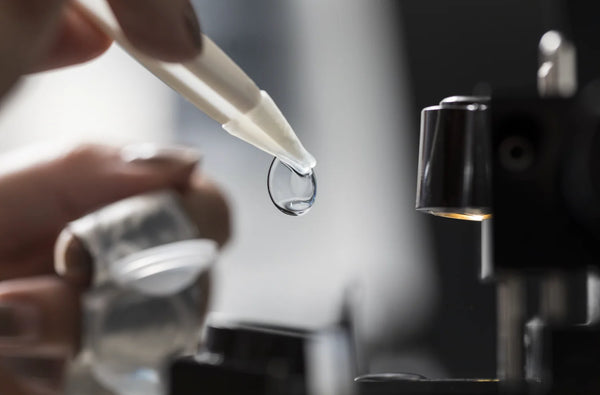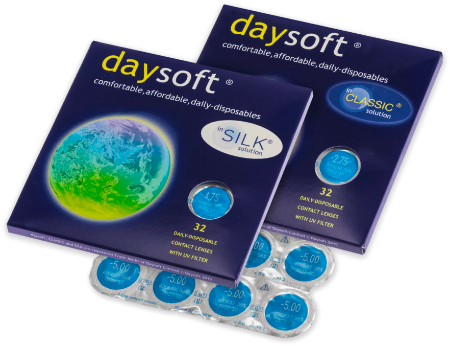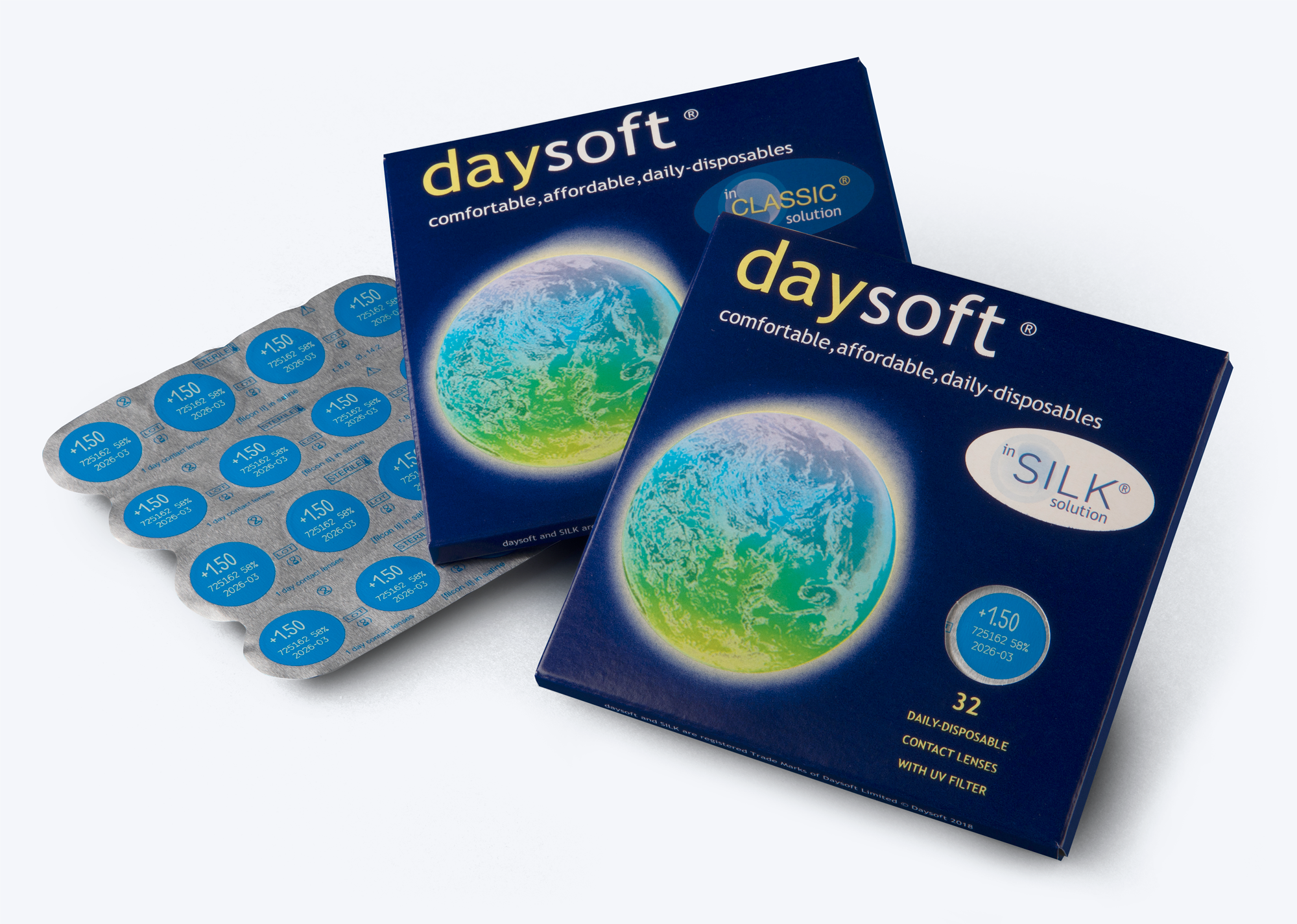As contact lens wearers, we prioritise comfort, clarity and convenience in our everyday lives. But have you ever stopped to consider what goes into the products we use daily? Recent discussions around ‘forever chemicals’, or PFAS (per- and polyfluoroalkyl substances), have raised important questions about the safety of any consumer products, including contact lenses.
Here, we explore what these chemicals are, why they’re concerning, and what you can do to ensure your daily disposable contact lenses are safe.
What are forever chemicals?
Forever chemicals, known scientifically as per- and polyfluoroalkyl substances (PFAS), are a group of synthetic compounds that have been used in various industries since the 1940s.
They are termed ‘forever’ because they do not break down naturally in the environment and can accumulate over time in the human body. This persistence makes them highly problematic from both health and environmental perspectives.

What are PFAS used for?
PFAS are incredibly versatile and have been used in a wide array of products because of their resistance to water, grease, and stains. You’ll find them in non-stick cookware, water-repellent fabrics, firefighting foams, and even some food packaging.
However, this same resistance that makes them so useful also leads to their persistence in the environment and potential harm to human health.
Are there forever chemicals in contact lenses?
So, how do these chemicals end up in contact lenses? PFAS are sometimes used in the manufacturing process to improve the durability and performance of contact lenses. They can enhance the lenses’ resistance to water and lipids, making them more comfortable and longer-lasting.
The presence of PFAS in contact lenses therefore raises concerns about prolonged exposure to these chemicals directly on your eyes. In 2023, a lab certified by the United States Environmental Protection Agency (EPA) detected traces of PFAS in 18 popular contact lens brands, but whether or not that is dangerous to consumer health is unknown.
At daysoft, we prioritise your safety and comfort by following stringent safety procedures to limit the risk of PFAS exposure. All water used in our manufacturing process is purified using reverse osmosis, ensuring no harmful contaminants come into contact with your lenses. Our rigorous quality control measures and dedication to using safe materials reflect our commitment to providing high-quality, safe contact lenses.
Our lenses are meticulously manufactured at our state-of-the-art facility in Blantyre, Scotland, under a certified quality management system compliant with BS EN ISO 13485. This ensures that every step, from production to sterilisation, meets rigorous quality standards, guaranteeing the safety and efficacy of our lenses.
We focus exclusively on daily disposable lenses because we believe that wearing fresh, sterile lenses every day is the healthiest and most convenient way to use contacts. Discover more about why daysoft daily disposable contact lenses are the safest option.
Why are PFAS problematic?
While PFAS have provided certain benefits in industrial applications, their long-lasting presence in the environment and potential health impacts make them a major concern. Here’s why:
They don’t biodegrade
Unlike many other chemicals, PFAS do not degrade over time, meaning they can linger in the environment for decades. They can contaminate soil and water, spreading far and wide and affecting entire ecosystems.
When these chemicals enter our bodies – whether through contaminated water, food, or other means – they can remain for years. For a detailed look at the impact of PFAS in drinking water, for example, check out this recent article on PFAS contamination.
They pose serious health risks
Their persistence poses significant health risks. Research has linked PFAS exposure to a range of health issues, including:
- liver damage
- thyroid disease
- decreased fertility
- certain cancers.
The spread is prolific: trifluoroacetic acid, a class of forever chemical thought to damage fertility and child development, has been found in drinking water and rain. Plus, the fact that these chemicals can build up in our bodies over time means that even low levels of exposure can become problematic in the long run.
They harm the environment
From an environmental perspective, the accumulation of PFAS in the ecosystem is equally troubling. Wildlife can be affected, and the contamination can spread through the food chain, impacting various species and their habitats.
Are contact lenses with PFAS safe to wear?
PFAS in soft contact lenses have recently made headlines. While there are currently no published case reports or formal safety alerts indicating direct harmful effects of PFAS in contact lenses, concerns have been raised in the US.
The U.S. government’s Environmental Protection Agency (EWA) has set new PFAS limits for drinking water, highlighting the increasing awareness and regulatory actions surrounding these chemicals. This underscores the need for vigilance and further research into PFAS, not only in water but in everyday products like contact lenses. Regulation is necessary to mitigate their effects and protect both public health and the environment.

What can I do about forever chemicals in contact lenses?
While the long-term health implications of this exposure are still being studied, it’s prudent to be cautious. As a health-conscious consumer, you have the power to make informed choices about the products you use. Here are a few steps you can take to mitigate the risks associated with PFAS in contact lenses:
1 Consult your eye care professional
The UK’s College of Optometrists advice is to continue to wear contact lenses, which are medical devices with a longstanding safety track record. Your optometrist can ensure you are wearing the most suitable lenses for your eyes and confirm that your eyes are healthy and still appropriate for contact lens wear.
2 Choose trusted brands
Look for contact lens brands that prioritise safety and transparency about their manufacturing processes. daysoft, for example, ensures that all water used in its manufacturing is purified using reverse osmosis, significantly reducing the risk of contamination by PFAS.
daysoft is also committed to reducing plastic waste. While constraints exist around product manufacturing standards, we’re taking action to reduce our pre-consumer process plastic waste by 70% in 2024. Read more about Our Sustainable Resolutions.
3 Stay informed
Keep up to date with the latest research and news about PFAS and other potentially harmful chemicals in consumer products. Awareness is the first step toward making safer choices.
4 Advocate for change
Support initiatives and regulations aimed at reducing or eliminating the use of PFAS in consumer products. Your voice can contribute to broader changes in industry practices.
Being informed and proactive can help you make safer choices. By opting for brands that prioritise health and sustainability, staying informed about potential risks, and advocating for change, you can enjoy the benefits of contact lenses without compromising your well-being. At daysoft, we are committed to providing you with high-quality, safe, and reliable contact lenses, ensuring your eyes – and the environment – are well taken care of.




